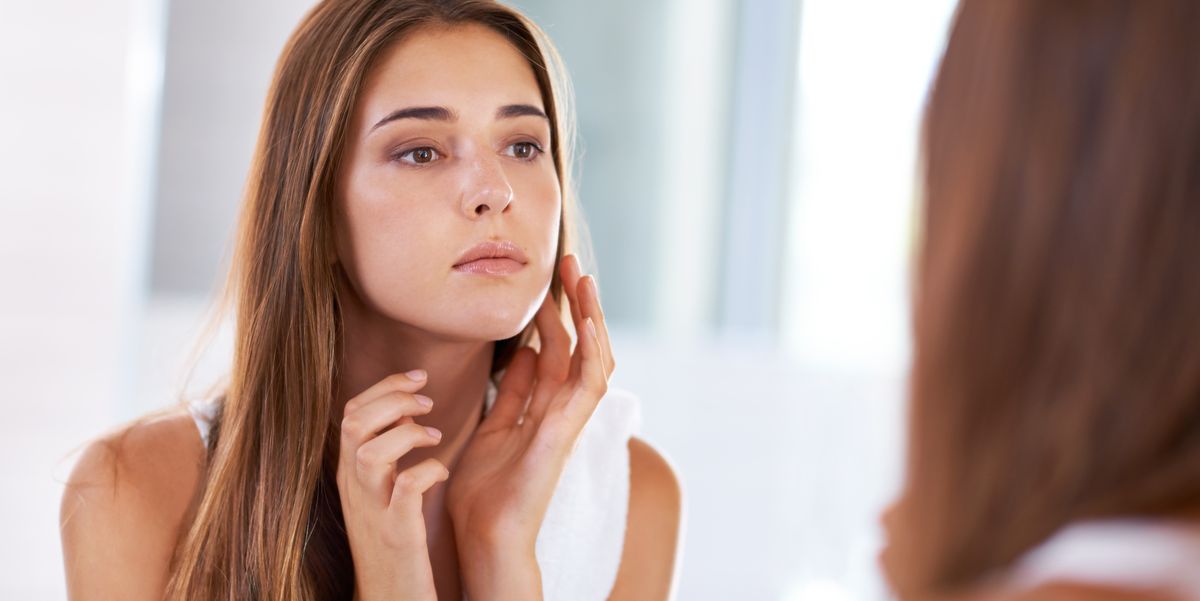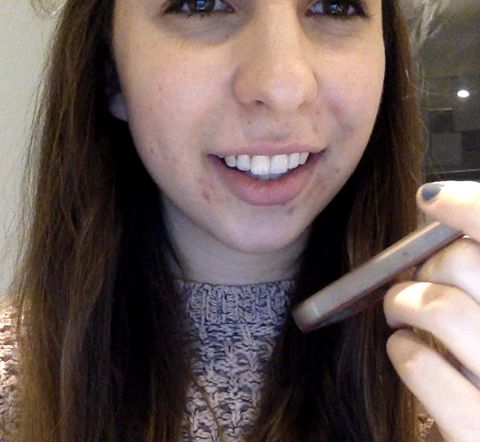I can’t remember a time when I didn’t pick my skin. Of course there must’ve been a time, before I was plagued with puberty and started to sprout small pimples in all regions of my face, the acne indiscriminate in its placement or size. But in my memory, it’s always been there—the irresistible urge to squeeze, to touch, and to pick.
In my childhood home, there was a mirrored medicine cabinet hanging on the bathroom wall, and at night, I would hop up on the counter and examine my skin close up, messing with whatever clogged pores and flaking scabs I could find. I did this so often that my mom would tell me I was going to ruin the counter by sitting on it so much.
As an “adult,” my skin has gone through waves. I relish the time I showed up to coffee with a friend, and she remarked that my skin was “glowing.” But I also flinch at the memories of going to workout classes sans makeup and telling myself over and over that no one was looking at the red blemishes on my face, even though deep down, I was convinced they were.
On my good skin days, my friends and family would tell me it looked great, and I’d quickly urge them to stop. “Don’t jinx it!” I’d say, when in reality “jinxing” it meant me sitting in front of a mirror looking for any imperfection in my “good skin” of the day and trying to make it better. Which, of course, would only serve to have the opposite effect.
The simple truth is I have a hard time not picking and genuinely don’t understand how others resist; for me, it’s a compulsion and a shameful one at that. The cycle normally goes: Pick at my skin, realize I’m doing something wrong, and then walk around the next day with the evidence laid out for everyone to see—the marks I develop after picking are often hard to cover up—knowing I only have myself to blame. I’ll try to tell myself that it doesn’t matter what I look like, that it doesn’t matter if my skin is clear. I’ll say to myself that I cannot spend my precious time worrying about such vain things, even though I often do.
“We are all guilty of it, picking at a blemish or imperfection on our skin,” Cindy Kim, the co-founder of Silver Mirror facial bar told me, when I asked about my tendencies. “For some it is simply a habit —to obtain that satisfying feeling of getting something out. When you pop a pimple, the brain releases dopamine, and you end up getting addicted to that feeling. For others, it is a response to some form of stress and can be a coping mechanism to feel like one has some semblance of control. And in extreme cases, it can indicate a more severe disorder.” She explained how picking could lead to damaging results: “There is a high chance and risk of causing further breakouts, inflaming an existing blemish, and permanent scarring.”
Naturally people in my life, namely my boyfriend and my mom, had pointed this out to me before. But I still couldn’t connect the dots, couldn’t comprehend that I could do something to stop this pattern.
But one day, as I was scrolling through Instagram, I saw a post from Alyssa Coscarelli, former Refinery29 editor turned full-time influencer. In her post, she spoke about her experience with skin picking, how she had struggled with it for years before seeking behavioral therapy.
Reading her post felt like an overdue wake-up call. I realized this was something I’d have to actively teach myself not to do, whether that meant trying new tricks or seeking out therapy. I didn’t just naturally have a poor complexion, though I am prone to acne—I was actively making it worse. And I wasn’t alone; other women had the same problem, the same anxieties, and the same results.
In her December 2019 New York Magazine cover, writer and actress Tavi Gevinson described how she too had started to pick. “In 2014, the same year I moved to New York, with my face on the cover of this very magazine, I developed a habit of picking at its skin,” she wrote. “Once I realize what I have done, I examine my reflection and feel like a stupid feral animal. I hate that my face so easily betrays my anxiety, that whether I go bare or wear cakey makeup, I am wearing my psychology for all to see. The self-loathing leads to more picking, and the cycle continues.”
In short: I had been seen. I wanted to learn more from women who’ve been open about their picking, so I reached out to Rio Viera-Newton, a beauty writer at The Strategist who’s written extensively about her skincare routine and her own picking past. Viera-Newton says she has memories of brutally picking when she was as young as 12 or 13, explaining that in her head, an extraction meant a quicker recovery time (I’ve been there, too). “Now I know that’s completely false because botched extractions (of which I’ve had many) can really damage the skin and leave behind marks that take weeks, if not months, to heal,” she says.
To try and stop her picking, Viera-Newton says it’s important to feel like she’s doing something “proactive,” while not taking part in anything aggressive or harmful. Sometimes she’ll wrap an ice cube in a thin washcloth and then rub it in circular motions around a zit, one minute on, one minute off for about 10 minutes. “It knocks so much of the swelling down, and it’s incredibly satisfying to watch it shrink. You can also use a cold jade roller or spoons for this as well.” If she sees some redness or feels something coming to the surface that she wants to pick, she’ll throw a pimple patch on top so she can’t see it.
I also spoke with Viera-Newton’s esthetician, Sofie Pavitt, who owns a facial studio in New York City. Pavitt says she sees a lot of clients who have trouble with picking, calling it a “subconscious reflex and reaction to stress.” Pavitt also recommended icing to bring down inflammation, as well as completely throwing away your magnifying mirror, which she notes is a “ridiculous invention.” She’ll even tell clients to cover up their mirror or take the light bulb out of their bathroom.
Lately, I’ve been trying a few new things to curb my habit. I hid my magnifying mirror in the back of my closet (though after Pavitt’s advice, I’ve decided to give it away) and started putting my makeup on in my full-length mirror, where I’m unable to see every detail of my skin. I employed my boyfriend to tell me whenever I am unintentionally touching my face, which turns out to be way more than I thought. Whenever I feel myself itching to pick a new pimple or a scab, I say, “this will not help, this will not help, this will not help” on a loop in my head. Most recently, when I do catch myself absentmindedly reaching toward my face, I stop and consider what I’m thinking about at that moment and find, often, it is something stressful or worrisome.
Don’t get me wrong; I still desperately want to pop a pimple whenever I see one, or occasionally pick at a scab, but at least now I have new methods to cope. As Viera-Newton told me, “Instead of setting unrealistic expectations for yourself that you’re bound to break, it’s all about understanding and finding tools that mimic that same kind of satisfaction that you get with picking through less harmful and invasive ways.”
Mine are not perfect solutions, but they are something. (In all honesty, the other week I lied to my boyfriend and told him I was brushing my teeth when in reality I escaped to the bathroom to pick.) And I’ve been more vocal about my skin picking, something I never would’ve dreamed of talking about even a year ago. Once I started opening up about it, others did too; when I told my co-worker about this piece, she was honest about her own picking, admitting she never would’ve said something if I hadn’t first. These stories have made me feel less embarrassed about this thing that I tried to ignore for so long. I still instinctually travel with my concealer tucked in my purse, ready to cover up any leftover damage I’ve created, but at least it’s a start.
If you need professional help for skin picking or self-harm, please visit the National Alliance on Mental Illness for resources and support.

